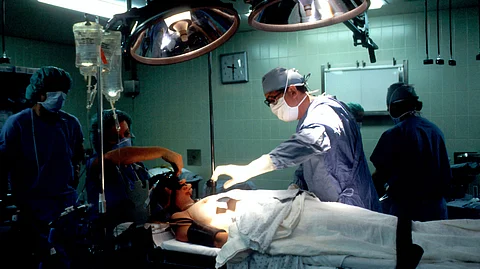

In a remarkable medical feat, doctors from Chennai successfully performed a critical surgery on a premature baby boy diagnosed with the rare Amyand’s hernia. This case is only the fourth ever reported globally, making it a significant milestone in neonatal surgery.
The baby, born at 28 weeks to Manju, a housewife, and Moorthy, a minimum-wage laborer, was diagnosed with Amyand’s hernia after 23 days in the neonatal intensive care unit (NICU). Amyand’s hernia is a rare condition where the appendix is found within an inguinal hernia, which in this case, had become perforated—a situation that occurs in only 0.1% of Amyand's hernia cases.
According to medical officials, the baby boy was under NICU care from birth due to his premature status. During this time, doctors noticed swelling in his right inguinoscrotal area, a sign of hernia. Given the life-threatening nature of the condition, an emergency surgery was performed.
It is only the fourth case of its kind in medical history in the world.
SRM Global Hospitals
Doctors explained that hernias are common in preterm babies, especially inguinal hernias, due to their underdeveloped abdominal wall muscles. However, Amyand’s hernia is exceedingly rare, statistically affecting only 0.42% of babies with inguinal hernia. Even rarer is the complication of a perforated appendix within the hernia, as seen in this case.
The surgical team faced significant challenges. Premature infants have immature airways, making the administration of anesthesia difficult and risky. Additionally, their low birth weight requires special post-operative care in the NICU to ensure a smooth recovery. Despite these hurdles, the surgery, which lasted over an hour, was successful.
The newborn had been in the Neonatal ICU since birth. The baby developed obstructed right inguinoscrotal swelling on the 23rd day. We had to do emergency surgery, as the condition was life-threatening,
Dr. Saravana Balaji
The baby responded well to the surgery and post-operative care. He showed steady progress in weight gain, reaching 2.06 kg before being discharged in good health.
Amyand’s hernia is a rare type of inguinal hernia in which the appendix becomes trapped within the hernia sac. While inguinal hernias are common in premature babies, Amyand’s hernia is much less frequent. The condition was named after Claudius Amyand, the surgeon who first described it in 1735.
Amyand’s hernia becomes dangerous if the appendix becomes inflamed or perforated, which can lead to life-threatening complications like sepsis. Diagnosing this condition preoperatively is difficult since it mimics a typical inguinal hernia. Often, the diagnosis is made during surgery.
In the case of perforation, as seen in this baby boy, emergency surgery is crucial. The treatment usually involves the removal of the appendix (appendectomy) and repair of the hernia (herniorrhaphy). Post-surgery care, especially for premature babies, is critical for a successful recovery.
This successful surgery adds to the limited global cases and highlights the expertise of Indian doctors in handling such rare and complex medical conditions.
Input from various sources
(Rehash//Yash Kamble/MSM)
